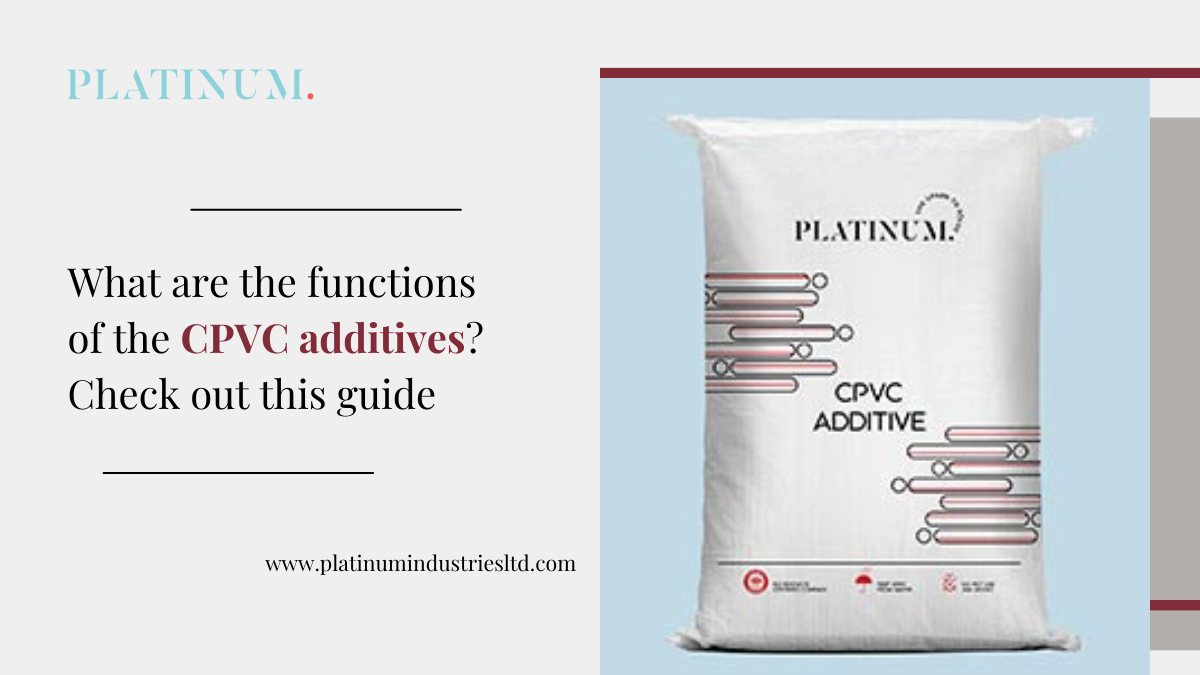What is CPVC?
Chlorinated Polyvinyl Chloride, or CPVC, is a special type of Polyvinyl Chloride that has extra formulations of chloride generated using thermal or UV energy. CPVC is a heat resistant and corrosion resistant compound that is primarily used for industrial manufacturing purposes, particularly in piping and fitting materials.
Its popularity in the manufacturing industry can be attributed to the following properties:
- Cost-effectiveness
- High glass transition temperature
- High heat and corrosion resistance
- Inertness to acids, bases, and salts
- Outstanding mechanical, dielectric, and flame and smoke properties
- Good performance at high operating temperatures
When the CPVC resin is infused with additives, it creates CPVC additives. These compounds are much more processeable and enhance the CPVC resin’s immunity to chemicals, thereby protecting industrial equipment from wear and tear. Add to this the inherent heat and pressure resistance of CPVC, and you have got additives that are invaluable compounds for the manufacturing of industrial and commercial equipment.
CPVC Applications:
Given its flexibility and versatility, CPVC additives from the best CPVC additives manufacturers are used to produce a range of products as well as in a variety of functions. Below, we are breaking down some of them briefly:
Functions in Products:
CPVC additives can be manufactured or fabricated to create a range of industrial products. This process can use techniques such as standard molding, primary extrusion, and injection molding.
Pipe and Fittings: This is the most common use of CPVC additives in the manufacturing industry. Being resistant to corrosion, heat, and pressure, the compounds are used to produce a variety of pipes and fittings. Do note that dending on the types of compounds used, the schedule, the temperature and the size of the pipes, there can be variations in the pressure resistance of the pipes.
Ducting: CPVC can be manufactured in round duct, fabricated duct fittings, industrial sheet, and welding rod. Due to this versatility, the additives are used to manage fume handling systems, making them more reliable even in the face of corrosion. However, approach only the best CPVC compound manufacturer to procure these products.
Sheet and Lining: Building on the corrosion and heat resistance of CPVC, these products commonly use the additives compound for industrial applications. CPVC-manufactured sheet and lining are often covered with Fiber Reinforced Polyester (FRP).
Custom Fabrication and Injection Molded Parts: CPVC is quite malleable, making it easy to cut and weld. It is also chemically inert. As a result, it is a preferred choice for tower packing, holding tanks for acids and bases, and hoods for specialty exhaust.
Function in Applications:
As we saw earlier, the physical properties of CPVC make it a formidable material to be used in industrial applications such as chemical and mineral processing plants, residential homes, hotel plumbing, and so on. It is cost-effective, comes with a better quality at Platinum, is hassle-free, and extremely long-lasting even in the harshest environments. You can use the additives for the following applications:
Transportation in Chemical Processing: You can transport the most aggressive metals at high temperatures and pressures, without worrying about corrosion.
Transportation in Chlor-Alkali: No matter how corrosive the environment, CPVC additives including CPVC superpacks can be used to transport chemicals.
Commercial Plumbing: Being a high-quality compound, you can automatically reduce maintenance costs by eliminating the risks of corrosion.
Operations in Mineral Processing: The chemical inertness of CPVC additives helps it process precious and raw materials at high pressures and temperatures.
Power Generation: Another application of CPVC due to its pressure resistant properties is in the power generation industry. It can also withstand corrosive chemicals used in these power plants.
Semi- conductor: CPVC protects against corrosion of chemicals and helps maintain the high quality standards.
Transportation for Wastewater Treatment: Lastly, another benefit of CPVC’s anti-corrosion properties is its valuable use in treating wastewater by transporting corrosive disinfecting chemicals.
Fire suppression systems: Being heat resistant, CPVC compounds can be used in building reliable fire suppression systems.
Platinum offers the most superlative quality of CPVC additives through add packs and compounds. Contact us to know more.

